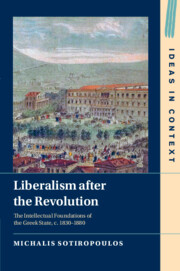Book contents
- Liberalism after the Revolution
- Ideas In Context
- Liberalism after the Revolution
- Copyright page
- Contents
- Acknowledgements
- Note on Transliteration
- Abbreviations
- Introduction
- Chapter 1 Mind the Legal Gap
- Chapter 2 ‘Romanist’ Jurisprudence
- Chapter 3 ‘It’s More Than Economics, Stupid’
- Chapter 4 ‘Let’s Talk about the Nation and the State’
- Chapter 5 The Law of Nations, Sovereignty and the International Autonomy of the Greek State
- Chapter 6 Ideas into Practice
- Conclusion
- Bibliography
- Index
Chapter 4 - ‘Let’s Talk about the Nation and the State’
Constitutional Liberalism, Sovereignty and Statehood (Late 1840s–1860s)
Published online by Cambridge University Press: 01 December 2022
- Liberalism after the Revolution
- Ideas In Context
- Liberalism after the Revolution
- Copyright page
- Contents
- Acknowledgements
- Note on Transliteration
- Abbreviations
- Introduction
- Chapter 1 Mind the Legal Gap
- Chapter 2 ‘Romanist’ Jurisprudence
- Chapter 3 ‘It’s More Than Economics, Stupid’
- Chapter 4 ‘Let’s Talk about the Nation and the State’
- Chapter 5 The Law of Nations, Sovereignty and the International Autonomy of the Greek State
- Chapter 6 Ideas into Practice
- Conclusion
- Bibliography
- Index
Summary
Chapter 4 demonstrates that the recommendations that favoured state intervention were coupled with a different way of thinking about political power: its nature, its sources and its organisation. The intellectual éminence grise behind this was Nikolaos Saripolos, who, after coming to Greece and being elected to the Law School in 1846, was to become the country’s leading constitutional and international law scholar. Being mindful of the revolutionary tradition and fusing together several different intellectual currents (Rousseau, Doctrinaires, the monarchiens, Benjamin Constant), Saripolos changed the terms of constitutional thinking by drawing on the revolutionary idioms of natural rights and national sovereignty. This was a liberal, governmental discourse that spoke in terms of sovereignty as self-rule and of the state as a moral person with rights in the international arena. As the chapter demonstrates, for Saripolos – as well as for the economist Ioannis Soutsos – the state in the form it then took had become an obstacle to the formation of the nation and was undermining social cohesion.
Keywords
- Type
- Chapter
- Information
- Liberalism after the RevolutionThe Intellectual Foundations of the Greek State, c. 1830–1880, pp. 132 - 165Publisher: Cambridge University PressPrint publication year: 2022

